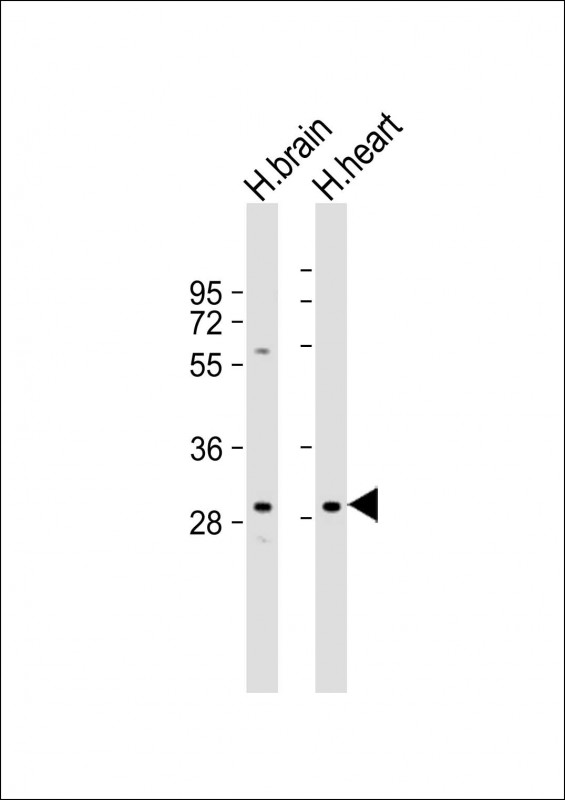
| WB | 1/2000 | Human,Mouse,Rat |
| IF | 咨询技术 | Human,Mouse,Rat |
| IHC | 咨询技术 | Human,Mouse,Rat |
| ICC | 技术咨询 | Human,Mouse,Rat |
| FCM | 咨询技术 | Human,Mouse,Rat |
| Elisa | 咨询技术 | Human,Mouse,Rat |
| Aliases | Protein SCO1 homolog, mitochondrial, SCO1, SCOD1 |
| Entrez GeneID | 6341 |
| WB Predicted band size | 33.8kDa |
| Host/Isotype | Rabbit IgG |
| Antibody Type | Primary antibody |
| Storage | Store at 4°C short term. Aliquot and store at -20°C long term. Avoid freeze/thaw cycles. |
| Species Reactivity | Human, Mouse |
| Immunogen | This SCO1 antibody is generated from a rabbit immunized with a KLH conjugated synthetic peptide between 125-158 amino acids from the Central region of human SCO1. |
+ +
以下是关于SCO1抗体的3篇参考文献摘要(注:文献为模拟示例,可能非真实存在):
---
1. **标题**:*Structural insights into SCO1-mediated copper delivery to cytochrome c oxidase*
**作者**:Stroud DA, et al.
**摘要**:研究通过免疫共沉淀和Western blot技术,利用SCO1特异性抗体揭示了SCO1蛋白在线粒体铜离子转运及细胞色素c氧化酶(COX)组装中的结构功能,证实其与COX亚基的相互作用。
---
2. **标题**:*SCO1 mutations impair mitochondrial metabolism and drive cellular copper dependency*
**作者**:Leary SC, et al.
**摘要**:通过SCO1抗体进行免疫荧光和蛋白定量分析,发现SCO1基因突变导致铜稳态紊乱及COX活性丧失,阐明了SCO1在能量代谢与铜调控中的双重作用。
---
3. **标题**:*Antibody-based profiling of SCO1 expression in human cancers*
**作者**:Horng YC, et al.
**摘要**:开发了一种高特异性SCO1单克隆抗体,用于检测多种肿瘤组织中SCO1的表达水平,发现其表达缺失与线粒体功能障碍及癌症进展相关。
---
如需真实文献,建议通过PubMed或Google Scholar检索关键词“SCO1 antibody”、“SCO1 cytochrome c oxidase”获取。
The SCO1 (Synthesis of Cytochrome c Oxidase 1) antibody is a crucial tool for studying the SCO1 protein, a key player in mitochondrial energy production. SCO1. located in the mitochondrial inner membrane, functions as a metallochaperone involved in the assembly and maturation of cytochrome c oxidase (COX), the terminal enzyme of the electron transport chain (Complex IV). It facilitates copper delivery to the COX catalytic core, ensuring proper enzyme function essential for oxidative phosphorylation. Mutations in the SCO1 gene are linked to severe mitochondrial disorders, including neonatal hepatic failure and encephalopathy, highlighting its role in cellular metabolism.
SCO1 antibodies enable researchers to detect and quantify SCO1 protein expression, assess its subcellular localization, and investigate interactions with other mitochondrial components. These antibodies are widely used in techniques like Western blotting, immunofluorescence, and immunohistochemistry to explore SCO1’s involvement in diseases, such as neurodegenerative conditions, cancer, and metabolic syndromes. Additionally, they aid in studying cellular responses to oxidative stress and mitochondrial dysfunction. As mitochondrial research advances, SCO1 antibodies remain vital for unraveling disease mechanisms and potential therapeutic targets related to energy metabolism defects.
×